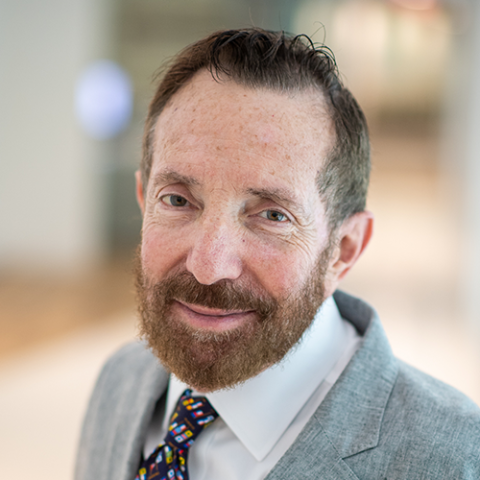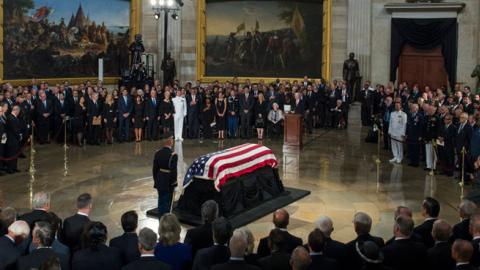After learning last year that he had a serious form of brain cancer, John McCain told an interviewer that he’d had a great life. He said he would fight the disease. His behavior following the diagnosis showed the same courage that graced his life: He sought medical help, ignored advice about travel, returned from Arizona to the Senate and continued, so long as he was able, to act and speak as the Senate’s most distinguished member.
As repellent as it is to make the comparison, McCain shared one characteristic with Shakespeare’s Julius Caesar: bravery. Warned, by his wife Calpurnia’s premonitions, not to attend the Senate, Caesar answered: “Cowards die many times before their deaths; The valiant never taste of death but once.... What can be avoided whose end is purposed by the mighty gods?”
But here the similarity ends: Caesar’s personal ambition for power far outpaced his respect for the Roman republic. He would do anything to subvert it so long as this advanced his imperial desires.
McCain, in contrast, did whatever he felt necessary to strengthen the American republic: oppose torture despite public sentiment after the 9/11 attacks; put teeth into campaign finance reform—albeit with the backdrop of his own link to the 1989 “Keating Five” scandal; admitted that the 2003 U.S. invasion of Iraq had been a mistake; set principled action, as he understood it, above loyalty to his own political party, and accepted the possible consequences.
In this, McCain resembled Henry Clay, the great Kentucky senator whose skill at negotiating with the political opposition forestalled the Civil War, with the Missouri Compromise of 1820 and the 1850 Compromise.
Clay’s best-known remark was that he “would rather be right than president.” McCain never expressed such a view but his life leaned in the same direction, valuing decency at the same rate as achievement.
In a nation such as ours that accepts the tension between the goodness of intent and the results of purposeful action, McCain was not the anomaly that his eulogists claim. He stubbornly did right as he was given to see the right. So did his nation, when it fought a war rather than accept disunion. And so does the U.S. today, when it forbids American firms from operating abroad according to the corrupt practices common to other states.
John McCain was a war hero. Unlike Caesar, who says his reputation and visage assure his safety against senate plotters who “ne’er look’d but on my back,” McCain had no illusions about the dangers he faced as a Navy pilot in Vietnam; North Vietnamese anti-air-warfare was sophisticated and effective. Captured American pilots were badly mistreated and tortured, as was McCain. His refusal of early release—as the son of the newly-appointed American commander of U.S. Pacific forces—is an example of bravery and honor that distinguishes him for exceptional moral and physical courage.
As often observed, McCain had a temper; senior military officers I know experienced it when testifying before the Senate. That temper was rooted in his spirited character, another side of which was his delight in bucking authority—behavior amply demonstrated by his various adventures and punishments as a midshipman at the U.S. Naval Academy.
The more important demonstration of McCain’s spiritedness, however, was his love of what is good about the United States: its principled attachment to liberty. The same spiritedness guided his dauntless effort to preserve and advance it, as well as his almost gleeful embraces across the political aisle that exemplified a politics of moderation. McCain loved liberty, and you could see it in his ideas and how he went about making them real, both at home and abroad where the future of our liberties is attached to the success of others.
Abraham Lincoln delivered a eulogy for John McCain’s senatorial precursor in July 1852. Lincoln’s description bears repeating in its closeness to McCain:
“Mr. Clay’s predominant sentiment, from first to last, was a deep devotion to the cause of human liberty—a strong sympathy with the oppressed everywhere, and an ardent wish for their elevation. With him, this was a primary and all controlling passion. Subsidiary to this was the conduct of his whole life. He loved his country partly because it was his own country, but mostly because it was a free country; and he burned with a zeal for its advancement, prosperity, and glory, because he saw in such, the advancement, prosperity and glory of human liberty, human right, and human nature.”
Lincoln knew the virtues of a patriot; his description of them regarding Henry Clay applies equally to John McCain. May God rest his soul.

















